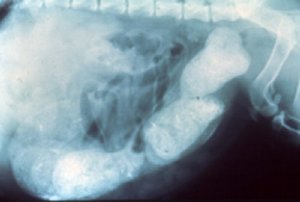 Back
Back
WHY DO ANIMALS SOMETIMES HAVE DIFFICULTY PASSING MOTIONS ? First broadcast on www.provet.co.uk |
This information is provided by Provet for educational purposes only.
You should seek the advice of your veterinarian if your pet is ill as only he or she can correctly advise on the diagnosis and recommend the treatment that is most appropriate for your pet.
If an animal has trouble passing faeces there are several possible reasons - all of which require a veterinarian to make an accurate diagnose and treat the problem.
Cats and dogs usually pass a motion once or twice a day, and occasionally more frequently. Constipation is reduced frequency or an absence of defaecation which can be caused by many things including :
- Dry bulky faeces. Water is removed from faeces in the colon, and anything that retains faeces longer in the large bowel results in dry faeces which can be difficult and sometimes painful to pass. Dogs and cats are creatures of habit and any change of environment (eg a period in a kennels or cattery; or reduced exercise) can result in constipation.
- Foreign material in the bowel lumen eg clothes, bones.
- Physical obstruction - something in the lumen or wall of the bowel, egs a cancer, or something compressing the colon in the pelvic canal such as an enlarge prostate gland in males, or late pregnancy in females. Hernias. A fractured pelvis.
- Neurological damage to the bowel - eg following injury to the spinal cord, or loss of muscle activity in the colon wall (called megacolon)
- Pain on defaecation - trauma, anal sac problems
- Several disorders can lead to constipation including thyroid diseases, and dehydration.

An XRay of a dog with large faecal masses in the colon - the typical appearance of constipation
Diagnosing the cause of constipation requires a full veterinary examination, which usually involves a rectal examination, and sometimes requires XRays and other procedures including laboratory tests. Fortunately most cases can be resolved by giving an enema, and treating the underlying cause. For example, an enlarged prostate gland due to hypertrophy is treated by castrating the dog.
Occasionally dietary management is needed to help the animal pass faeces, and high fibre rations have proved to be very useful in the management of constipation in animals. Your veterinarian will be able to recommend the most appropriate diet for your pet.
Updated October 2013